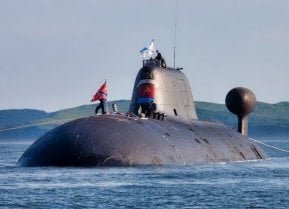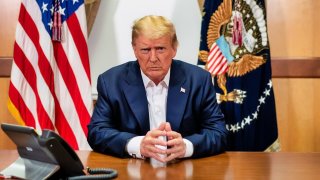What Would a Second Donald Trump Presidency Mean for U.S.-North Korea Relations?
If Trump were to return to the presidency, we might see more engagement with Kim Jong-un.
The U.S.-North Korea relationship experienced drastic shifts during Donald Trump’s presidency from 2017 to 2021, moving from the verge of war to warmer relations between the leaders of the two countries. This period ended with the failure of the Hanoi summit in February 2019 to agree on the security relationship. Subsequently, during Joe Biden’s presidency, North Korean leader Kim Jong-un has ensured that nuclear weapons will be a permanent feature of the country’s security posture. This is coupled with provocations against the United States and other countries through the development of not only nuclear weapons but also more powerful delivery vehicles and some nuclear warfighting capabilities.
The question arises whether some of the relationships established during Trump’s presidency could be reactivated if Trump were to be elected president again in January 2025. The stakes in the U.S.-North Korea relationship over the next four years are significant. It is unlikely that North Korea will negotiate on its denuclearization, having developed a nuclear weapons capability for deterrence.
However, North Korea’s actions are increasingly contrary to U.S. interests. Pyongyang is enhancing its capacity to deliver nuclear strikes deeper into U.S. territory while concurrently developing nuclear warfighting capabilities. These developments may lead North Korea to believe that its ability to target U.S. cities could prevent U.S. intervention if it were to engage in military action against South Korea. Would President Trump be able to avoid this alarming development, or would Trump inadvertently trigger a disastrous nuclear conflict with North Korea?
The statements of U.S. presidents hold significant weight in world politics, and Trump is known for some of his ill-considered remarks. He has referred to Kim Jong-un as “little rocket man” and boasted about the size and power of his nuclear button. Trump has also questioned why the United States possesses nuclear weapons if it does not intend to use them. These statements may suggest that Trump is under the illusion that a nuclear war can be won and that U.S. nuclear capacity serves purposes beyond just deterrence.
However, as a businessman, Trump views international problems relationally: if relations with North Korea are poor, negotiations can improve them. Consequently, Trump engages in dialogue even with figures like Kim Jong-un in an attempt to alter both the relationship and the behavior of North Korea. In contrast, Biden perceives his adversaries as inherently hostile, labeling China’s leader, Xi Jinping, a “dictator” and Russia’s president, a “killer.” Biden’s administration criticizes Trump for engaging with such leaders, failing to recognize that the policy positions of these leaders are not fixed but contingent on their relationship with Washington. This could be the initial premise for Trump to break the deadlock with North Korea; engaging with adversaries is the starting point for progress.
Trump’s speeches are unpredictable, and if his actions follow suit, the risk of war with North Korea exists. However, his reputation for unpredictability also creates a reality of probabilistic deterrence. Both adversaries and allies hesitate to risk war, unsure of whether the United States would intervene. Conversely, Biden’s statements in the media weeks before Russia’s invasion of Ukraine suggested that the U.S. response to a Russian attack would be limited to sanctions. Consequently, Putin could conclude that Russia would face sanctions regardless and could attack Ukraine with minimal consequences if the United States did not engage militarily.
Moreover, Biden guaranteed military support for Taiwan in the event of a Chinese attack, departing from previous U.S. policy. While this may deter Chinese aggression, it also emboldens Taiwan, as it now has assurances of military support. Maintaining strategic ambiguity would have left both parties uncertain and hesitant to provoke the other, as in the case of Korea.
Trump’s approach to the presidency was less ideological than the current humanitarian interventionist approach. As a businessman, Trump expects all countries to pursue their self-interests, with negotiations based on the exchange of objectives defined by each actor themselves. While this may lead to a more self-centered approach, it also respects each nation’s right to determine its own values and objectives. During Trump’s tenure, the United States did not feel obligated to solve other countries’ problems but instead focused on its own.
Although North Korea is a dictatorship, North Koreans would likely follow the leadership of their “supreme leader” over a foreign head of state, even from a democratic country. This is why Trump’s approach in North Korea and elsewhere did not provoke violent resistance against the United States. Respecting a country’s ability to define its objectives is a better starting point for negotiations than an attitude where one negotiator claims to represent both parties. Negotiation requires both parties to define their own interests, which is why the Biden administration engages less in dialogue with adversaries. If Trump were to return to the presidency, we might see more engagement, even with North Korea. Furthermore, presidents with a business-minded, self-interested approach tend to avoid wars, as wars are detrimental to business and self-interest.
For these reasons, Trump’s record in conflict prevention is relatively strong, surpassing that of President Biden or Obama. Based on data from the Uppsala University Conflict Data Program, global fatalities from organized violence systematically declined during the early years of Trump’s presidency and plateaued during the final year. Trump did not initiate any conflicts during his tenure. While he conducted two air operations against Syria’s air force in March 2017 and 2018, these actions expanded the ongoing conflict in Syria in which the United States was already involved.
Trump temporarily extended U.S. participation in counterterrorism efforts in Somalia by deploying permanent troops, but this expansion was short-lived. He also terminated direct military involvement in Libya and negotiated peace with the Taliban, thereby setting in motion the end of the twenty-year operation in Afghanistan.
In the case of North Korea, the United States came closer to a peace agreement than ever before following the successful negotiation of the 1994 Negotiated Framework. Although it may not be feasible to resume talks from where Trump and Kim Jong-un left off during Trump’s presidency, a businesslike, relational, self-interested approach could at least avert a path toward conflict between North Korea and the United States.
About the Author:
Timo Kivimäki is Professor of International Relations at the University of Bath.
Image: Shutterstock.


